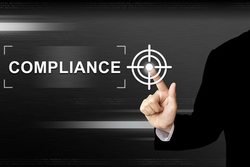
Updated: June 5, 2025 (Initial publication: June 20, 2024)
Publications

🌐follow Marie-Anne Frison-Roche on LinkedIn
🌐subscribe to the Newsletter MAFR Regulation, Compliance, Law
🌐subscribe to the Video Newsletter MAFR Surplomb
____
 ► Full Reference: M.-A. Frison-Roche, The will, the heart and the calculation, the three traits encercling the Compliance Obligation, March 2024.
► Full Reference: M.-A. Frison-Roche, The will, the heart and the calculation, the three traits encercling the Compliance Obligation, March 2024.
____
📝 This Working Paper is the basis for the contribution "The will, the heart and the calculation, the three traits encercling the Compliance Obligation", in📘Compliance Obligation.
____
► Summary of this Working Paper: There is often a dispute over the pertinent definition of Compliance Law, but the scale and force of the resulting obligation for the companies subject to it is clear. It remains difficult to define. First, we must not to be overwhelmed by the many obligations through which the Compliance Obligation takes shape, such as the obligation to map, to investigate, to be vigilant, to sanction, to educate, to collaborate, and so on. Not only this obligations list is very long, it is also open-ended, with companies themselves and judges adding to it as and when companies, sectors and cases require.
Nor should we be led astray by the distance that can be drawn between the contours of this Compliance Obligation, which can be as much a matter of will, a generous feeling for a close or distant other in space or time, or the result of a calculation. This plurality does not pose a problem if we do not concentrate all our efforts on distinguishing these secondary obligations from one another but on measuring what they are the implementation of, this Compliance Obligation which ensures that entities, companies, stakeholders and public authorities, contribute to achieving the Goals targeted by Compliance Law, Monumental Goals which give unity to the Compliance Obligation. Thus unified by the same spirit, the implementation of all these secondary obligations, which seem at once disparate, innumerable and often mechanical, find unity in their regime and the way in which Regulators and Judges must control, sanction and extend them, since the Compliance Obligation breathes a common spirit into them.
In the same way that the multiplicity of compliance techniques must not mask the uniqueness of the Compliance Obligation, the multiplicity of sources must not produce a similar screen. Indeed, the Legislator has often issued a prescription, an order with which companies must comply, Compliance then often being perceived as required obedience. But the company itself expresses a will that is autonomous from that of the Legislator, the vocabulary of self-regulation and/or ethics being used in this perspective, because it affirms that it devotes forces to taking into consideration the situation of others when it would not be compelled to do so, but that it does so nonetheless because it cares about them. However, the management of reputational risks and the value of bonds of trust, or a suspicious reading of managerial choices, lead us to say that all this is merely a calculation.
Thus, the contribution sets out to identify the Compliance Obligation by recognising the role of all these different sources. It emphasises that, in monitoring the proper performance of technical compliance obligations by Managers, Regulators and Judges, insofar as they implement the Compliance Obligation, it is pointless to limit oneself to a single source or to rank them abruptly in order of importance. The Compliance Obligation is part of the very definition of Compliance Law, built on the political ambition to achieve these Monumental Goals of preserving systems - banking, financial, energy, digital, etc. - in the future, so that human beings who cannot but depend on them are not crushed by them, or even benefit from them. This is the teleological yardstick by which the Compliance Obligation is measured, and with it all the secondary obligations that give it concrete form, whatever their source and whatever the reason why the initial standard was adopted.
In order to define Compliance's Obligation, the contribution endeavours to recognise the contribution of all these three sources: Will, Heart and Calculation.
_____
🔓read the developments below ⤵️
Jan. 17, 2024
Thesaurus : Doctrine

► Référence complète : P. Goossens, "Quand se justifie et quand s'arrête la collaboration ? À propos de la CJIP", in M.-A. Frison-Roche et M. Boissavy (dir.), Compliance et droits de la défense. Enquête interne – CJIP – CRPC, Journal of Regulation & Compliance (JoRC) et Dalloz, coll. "Régulations & Compliance", à paraître.
____
📕consulter une présentation générale de l'ouvrage, Compliance et droits de la défense. Enquête interne – CJIP – CRPC, dans lequel cet article est publié
____
► Résumé de l'article (fait par le Journal of Regulation & Compliance - JoRC) : L'auteur expose que dans le système juridique classique l'avocat est dans une "défense d'opposition". A cela, la loi dite "Sapin 2" ajoute une "défense de collaboration" qui s'articule plus ou moins bien avec la première.
L'article répertorie aussi bien les avantages que les inconvénients de la logique de collaboration que l'avocat doit prendre en charge. Avec pragmatisme l'avocat doit manier les deux, notamment pour que les droits de la défense de l'entreprise et les intérêts de celle-ci trouvent leur place dans le mécanisme de la CJIP
____
🦉Cet article est accessible en texte intégral pour les personnes inscrites aux enseignements de la Professeure Marie-Anne Frison-Roche
________
March 18, 2021
Thesaurus : Doctrine
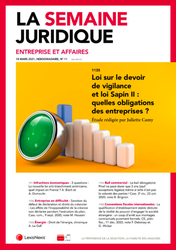
Feb. 18, 2021
Hearings by a Committee or Public organisation
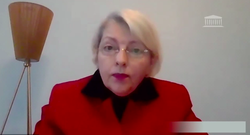
🌐suivre Marie-Anne Frison-Roche sur LinkedIn
🌐s'abonner à la Newsletter MAFR Regulation, Compliance, Law
____
► Référence complète : M.-A. Frison-Roche, audition par la Missions Evaluation de la loi dite "Sapin 2" au regard d'une "Europe de la Compliance" et réponses aux diverses questions posées, in auditions menées par par la Mission d'évaluation de la Loi relative à la transparence, à la lutte contre la corruption et à la modernisation de la vie économique, la loi dite "Sapin 2" dirigée par les députés Raphaël Gauvain et Olivier Marleix, Assemblée nationale, 18 février 2021.
____
L'Assemblée Nationale a confié à cette mission "d'établir un bilan approfondi des principaux apports de la loi "Sapin 2" et, si cela apparaît nécessaire, de proposer des pistes d'amélioration".
Regarder la video de l'intervention.
____
Se reporter à la présentation générale de la mission d'évaluation.
Se reporter à l'agenda de l'ensemble des auditions.
____
Lire ci-dessous les points essentiels sur lesquels s'est appuyée la présentation préalable de quelques minutes, centrée sur les points de méthode au regard de la perspective européenne, avant que le temps ne soit utilisé pour répondre aux questions posées par Messieurs les députés Raphaël Gauvain et Olivier Marleix.
Feb. 17, 2021
Teachings : Banking and Financial Regulatory Law - Semester 2021

Résumé de la leçon : Après avoir vu précédemment les règles techniques qui gouvernent la sanction et la prévention des Abus de marché, il convient pour mieux comprendre les décisions et les conflits de revenir sur la tension permanente et peut-être définitive qui marque les principes et la place de la répression dans le Droit de la régulation bancaire et financière : dans le même temps qu'elle est un outil presque ordinaire de la Régulation, puisque la répression des abus de marché assure l'intégrité et le fonctionnement des marchés financiers, la répression ne peut et ne doit se soustraire à ce avec quoi elle entretient un lien de filiation : le Droit pénal. Dès lors et par exemple, alors qu'au premier titre, l' efficacité est son premier souci, au second titre, les droits de la défense et le souci des secrets demeurent, tandis que la nature régalienne du Droit pénal trace un cercle par nature national alors que la Régulation financière est au mieux mondiale, au moins européenne.
Il convient de reprendre cette question à travers une perspective plus générale, notamment à travers le Droit pénal et le Droit européen, tel que celui-ci a été précédemment présenté.
En effet, dans le même temps et parce qu'il s'agit de mécanismes qui ne peuvent pas faire sécession avec le système juridique, sa structure et ses fondements, l'on pourrait penser que la répression en matière bancaire et financière est une déclinaison du Droit pénal général, qu'elle en emprunte et en respecte les principes généraux, concevant des infractions spéciales pour les besoins qui lui sont propres. Ainsi, tout ce qui caractérise le Droit pénal, l'élément intentionnel de l'infraction, le caractère restrictif de l'interprétation des textes, le principe de la personnalité des délits et des peines, le système procédural indissociable des règles substantielles (comme les charges de preuve ou le principe non bis in idem) devrait s'appliquer dans des infractions générales qui concernent le secteur, comme l'escroquerie ou l'abus de confiance comme dans les infractions plus particulières, comme l'abus de biens sociaux, voire des infractions spécifique comme le blanchiment d'argent.
Mais et tout d'abord, par souci d' efficacité, le droit a tout d'abord développé un système de répression qui a emprunté d'autres méthodes, imprégnées avant tout du souci d' efficacité. En outre, le droit a organisé une sorte de double jeu répressif, par un droit administratif répressif à la disposition des régulateurs, qui prend assez souvent distance par rapport au droit pénal classique, lequel continue pourtant de s'exercer.
Les tensions ne peuvent qu'apparaître. A l'intérieur du Droit pénal , dont les principes sont assouplis alors que la rigidité du Droit pénal est dans sa nature même, dans l'articulation du Droit pénal avec le Droit administratif répressif, guidé par le service efficace de l'ordre public de marché, les Cours constitutionnelles tentant de garder un équilibre à l'ensemble.
Il faut sans doute prendre acte que contrairement aux principes classiques, le droit pénal financier n'est plus autonome du reste de la régulation , la répression devient objective, l' efficacité est son critère et ses objectifs sont systémiques. La loi dite "Sapin 2" le manifeste en internalisant tout le dispositif répressif dans les opérateurs eux-mêmes, devenant à la fois les assujettis et les agents d'effectivité de la Régulation.
-
Revenir aux bases avec le Dictionnaire bilingue du Droit de la Régulation et de la Compliance
-
Approfondir par la Bibliographie générale du Droit de la Régulation bancaire et financière
Revenir à la présentation générale du cours
Revenir au plan général du cours
Utilisez les matériaux ci-dessous pour aller plus loin et préparer votre conférence de méthode:
Dec. 16, 2020
Thesaurus : Soft Law
Référence complète: Gauvain, R. et Marleix, O., Evaluation de la loi n° 2016-1691 du 9 décembre 2016 relative à la transparence, à la lutte contre la corruption et à la modernisation de la vie économique, dite « loi Sapin 2 », Commission des Lois, Assemblée nationale, 16 décembre 2020
Liste des personnalités auditionnées par la mission d'évaluation
Le 20 janvier:
- Françoise Dreyfus, professeure émérite de science politique de l’université de Paris I Panthéon-Sorbonne
- Michel Sapin, ancien ministre de l’Économie et des finances
Le 27 janvier:
- Elsa Pilichowski, directrice de la gouvernance publique à l'OCDE,
- Mathilde Mesnard, directrice adjointe des affaires financières et des entreprises à l'OCDE
- Patrick Moulette, chef de la division de la lutte contre la corruption à l'OCDE
- Julio Bacio Terracino, chef de la division de l’intégrité dans le secteur public à l'OCDE
Le 28 janvier:
- Éric Alt, vice-président de l’association Anticor
- Patrick Lefas, président de Transparency International France
- William Bourdon, président-fondateur de l’association Sherpa
- Chanez Mensous, chargée de contentieux et plaidoyer au sein du pôle flux financiers illicites chez Sherpa
Le 10 février:
May 28, 2020
Publications
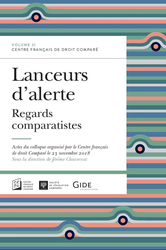
Full reference: Frison-Roche, M.-A., L'impossible unicité juridique de la catégorie des "lanceurs d'alertes" ("The impossible legal unicity of the category of "whistleblowers""), in Chacornac, J. (dir.), Lanceurs d'alertes, regards comparatistes, ("Whistleblowers, comparative perspectives"), Publications of the Centre français de droit comparé ("French Comparative Law Center"), May 2020, Volume 21, p.13-31.
Read the article (in French).
Read the general presentation of the collective book in which this article is published
Read the bilingual working paper which had served of basis for this article.
Read the presentation of the conference "Les lanceurs d'alertes: glose" (Whistleblowers: glose") and especially the slides elabored for the colloquium organized by the Centre français de droit comparé ("French Comparative Law Center") on 23th of November 2018 under the direction of Jérôme Chacornac
____
Introduction of the article
"Whistleblowers". This is a new expression. Which is a great success. Barely heard once, we hear it everywhere ...
A topic not of course or knowledge test, but rather a topic of daily conversation. Because it is spoken to us every day, in more or less gracious terms. For example President Donald Trump on October 1, 2019 declared to the press "want to question" the whistleblower who would have illegally denounced him and would not, according to him, have the right to conceal his identity, proof in this according to him of the lying character of his assertions against him, while his lawyer indicates on October 6, 2019 that he is not speaking on behalf of a single whistleblower thus taken to task but of a plurality of people who gave information against the President of the United States. Even the most imaginative screenwriters would not have written such brutal and rapid twists and turns. Spectators, we are waiting for the next episode, secretly hoping for the escalation.
And precisely if we go to the cinema, it is still a whistleblower whose dedication and success, we are told about, even the drama, for the benefit of global society, and in particular democracy, since the secrets are fought for the benefit of the truth. The Secret Man designates Mark Felt as the first whistleblower. Returning to what we often present as being a more "serious" media!footnote-1391, we listen to France-Culture and here is another story told by a historian who worked as an archivist on events that political power would have liked to keep hidden by possibly destroying their traces but which its trade led to preserve: here it is expressly presented to the studious listeners like a "whistleblower" .... While the same radio tries to find the one who could well be, as in a kind of contest the "first whistleblower"!footnote-1727? .... This rewriting of History can be defended because ultimately what did other Voltaire do for Calas, or Zola for Dreyfus?
It is also a subject of legislative discussion since in the United States the Dodd-Frank law of 2010 inserted in the law of 1934 which established the Securities & Exchanges Commission a complete device of remuneration and remuneration of the whistleblowers, whereas after having developed flexible but guiding lines in this regard in 2012!footnote-1698, the European Commission published on November 20, 2018 the text of what will become a Directive intended to give a unified European status to the character, in the system gradually developed to protect the one who was presented in 2018 as that "cannot be punished for having done what is right".
In Europe, the Directive first approved by a Resolution of the European Parliament on April 16, 2019 on the protection of persons denouncing breaches of Union Law and then adopted on October 7, 2019 (Directive of the European Parliament and of the Council of European Union on the Protection of Persons who Report Violations of European Union Law, different title, it should be noted, will have to be transposed into the laws of the Member States within the next two years. , since only "violations of Union Law" are targeted, but the character of the "whistleblower" is more generally targeted: he is "whole"!footnote-1699.
In short, the whistleblower is a star!footnote-1390. A sort of historical figure, covered in blows and glory, going from Voltaire to Snowden, both of whom find themselves embodied on the screens!footnote-1681 ....,
Consecrated by law, which associates with it a legal regime of protection to such an extent that, like a Nessus tunic, it is this legal regime which will define the character and not the reverse. When we read the law of December 9, 2016 relating to transparency in the fight against corruption and the modernization of economic life, known as "Sapin 2", we notice that the Legislator makes much of this character, since 'he dedicates its chapter II to him!footnote-1682: "From the protection of whistleblowers", and that it is by his very protection that he formally opens the door of Right to him.
But why a plural? Admittedly when we read the recitals of the Community Directive of October 7, 2019 on the protection of whistleblowers!footnote-1702, it is only a list of all the subjects on which it is a good idea to protect them, which therefore prompts us to see in this plural only the index of this non-exhaustive list of subjects which it is good to tell us, a sign of the lack of definition of who should alert us. Reading the French law known as "Sapin 2" makes it less severe but more perplexing. Indeed, this plurality referred to by the title of the chapter devoted to "whistleblowers", there is no longer any question in the rest of the law, in the very definition which follows, article 6 which opens this chapter devoted to "whistleblowers" offering the reader immediately a singular since it begins as follows: "A!footnote-1684 whistleblower is a person ...". No mention of diversity. The art of legislative writing would however have required that the qualifying article not only be singular but that it should not yet be undefined. Stendhal if he had still deigned to have the law for bedside book would have wanted to find at the beginning of chapter a sentence like: "The!footnote-1683 whistleblower is a person ...".
Thus seem to contradict themselves within the law "Sapin 2 the very title which presents the character, in that it uses a defined plural (the) while the defining article which presents it is in the undefined singular (one). ...
Here is a first reason not to advance any more but in a very careful way, in this "step by step" that constitutes a reading word for word: a gloss. This consists of taking the expression itself literally. The second reason for this technical choice is that the gloss is well suited to the introduction of a collective work, thus allowing more targeted developments to take place in other contributions, on the techniques, the difficulties and the limits of this protection, or on its history, or the reasons for the arrival in French law of these whistleblowers and the way they develop, or not, elsewhere.
I am therefore going to content myself with taking this already legal expression to the letter: The (I) whistle (III). blowers (II).

Updated: Oct. 8, 2019 (Initial publication: Nov. 22, 2018)
Publications
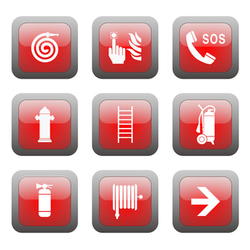
This working paper served as a basis for a conference done in French for the Centre de droit comparé (Center for Comparative Law) in Paris on 23 November 2018.
Updated, it has served as a basis for an article published in French in a book of the Société de Législation comparé (Society of Comparative Legislation).
________
"The whistleblowers". This is a new expression. Which wins a full success. Barely heard once, we hear it everywhere ...
A theme not only of academic teaching, but rather a topic of daily conversation. Because it is every day that we speak about it, in terms more or less graceful. For example President Donald Trump on October 1, 2019 told the press he "wants to interrogate" the whistleblower who would have unlawfully denounced him and would not have, according to him, the right to conceal his own identity, evidence in this according Donald Trump of the false character of his assertions against him, while his lawyer indicates on October 6, 2019 that he does not speak on behalf of a single whistleblower thus taken apart but of a plurality people who gave information against the President of the United States. Even the most imaginative scriptwriters would not have written twists as abruptly or so fast. Spectators, we wait for the next episode, secretly hoping for climbs and slashs.
Precisely if we go to the cinema, it is still a whistleblower whose dedication and success, or even drama, we are told, for the benefit of the global society, and especially of Democracy, since the secrets are fought for the benefit of the truth. Thus, the movie The Secret Man designates Mark Felt as the first whistleblower. Returning to what is often presented as a more "serious" media, for example in France the radio "France Culture" we can learn the story of a historian who worked as an archivist on events that the political power would have wanted to keep hidden by possibly destroying their traces but that his profession led to preserve
It is also a topic of legislative debate since in the United States the Dodd-Frank Act of 2010 inserted in the 1934 law that established the Securities & Exchanges Commission (SEC) a complete system for retribution and remuneration of whistleblowers, while after elaborating guidelines about about in 2012
In Europe, the Directive first approved by a Resolution of the European Parliament on 16 April 2019 on protection of persons reporting breaches of Union law and then adopted on 7 October 2019 (Directive 2019/78 (EU) of the European Parliament European Union and the Council of the European Union on the Protection of Persons Reporting Breaches of Union law, will have to be transposed in the next two years to the legal systems of the Member States. is not general, since only "violations of European Union Law" are targeted but the character of the "whistleblower" is more generally referred to: it is "whole"
In short, the whistleblower is a star
Recognized by national legislations, which associate to him a legal regime of protection to such a point that, like a tunic of Nessus, it is this legal regime which will define his character and not the opposite. When we read the French law of December 9, 2016 relative à la transparence à la lutte contre la corruption et à la modernisation de la vie économique (on transparency in the fight against corruption and the modernization of economic life), usually known as "Sapin 2 Act", we note that the lawmaker makes much of this character, because he devotes to him the chapter II: "De la protection des
But why a plural? Certainly when we read the recitals of the European Directive of 7 October 2019 on the protection of whistleblowers
Thus seem to contradict in this law "Sapin 2" itself the very title which presents the character, in that it uses a definite plural ("the whistleblowers") while the article of definition which presents the topic does it by using the singular indefinite : "a whistleblower....".
This is a first reason to move forward only in a very cautious way, in this "step by step" that constitutes a word-by-word reading: a gloss. This method consists in taking literally the expression itself. The second reason for this technical choice is that the gloss is well suited to an introduction of a collective work, allowing more specific developments to take place in other contributions, for example on the techniques, the difficulties and the limits of this protection, or the history of it, or the reasons for the arrival in French law of these American or Brithish whistleblowers and the way they develop, or not, in other legal systems or other countries.
I will therefore content myself with taking again literally this already legal expression: The (I) launchers (II) of alert (III).
See below developments.
On the more general fact that cinema is undoubtedly the medium which most seriously restores the state of the Law, c. Frison-Roche, M.-A., Au coeur du Droit, du cinéma et de la famille : la vie, 2016.
L'histoire du premier lanceur d'alerte, France Culture, septembre 2019.
European Commission, Guidelines on Whistleblowing, 6 of December 2012, SEC(2012) 679 final, updated on 23 of April 2018.
However, precisely the so common use of plurality ("whistleblowers") raises doubts about the uniqueness of the character. On this question, see. all the first part of the developments of this study, which leads to the conclusion rather than beyond the multitude of particular cases, there are rather two kinds of whistleblowers. V. infra I.
The director of the film La fille de Brest says that she considers the whistleblower at the origin of the case of the Pick as a "movie character".
Thus, the adventures of Snowden were brought to the screen by Oliver Stone in 2016, Snowden. On the question of knowing whether this film "faithfully reproduces" or not the case, Schetizer, P., Le film Snowden est-il à la hauteur de la réalité?, 2017. This article is favorable to the whistleblower, and to the film which tells us with emotion his case, in particular because (sic), it is easier than to read the Washington Post.
Underlined by us.
Underlined by us.
About this directive, v. the developments infra
Underlined by us.
April 25, 2019
Thesaurus : Doctrine
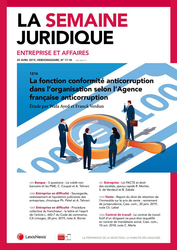
Full reference : Ayed,W., Verdun,F., La fonction conformité anticorruption dans l’organisation selon l’Agence française anticorruption, in La semaine juridique, Entreprises et Affaires, JCP, E, LexisNexis, n°17-18/1206, 25 avril 2019, pp.38-44.
Sciences Po students can read the article via the drive, folder "MAFR - Régulation - Compliance"
July 3, 2018
Thesaurus : Doctrine
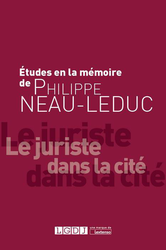
► Référence complète : Malabat, V., et Auzero, G., Les lanceurs d'alerte, in Études en l'honneur de Philippe Neau-Leduc, Le juriste dans la cité, coll. « Les mélanges », LGDJ- Lextenso, 2018, pp.673-684.
📕Lire une présentation générale dans lequel l'article est publié.
July 3, 2018
Thesaurus : Doctrine

Référence complète : Couret, A., Le retour de l'unanimité dans le droit des sociétés, in Études en l'honneur de Philippe Neau-Leduc, Le juriste dans la cité, coll. « Les mélanges », LGDJ- Lextenso, 2018, pp.279-286.
Lire une présentation générale dans lequel l'article est publié.
April 11, 2018
Teachings : Droit de la régulation bancaire et financière, semestre de printemps 2017-2018
March 1, 2018
Thesaurus : Doctrine
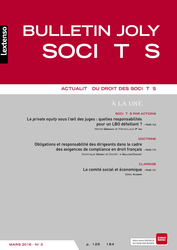
Référence complète : Dedieu, D., et Gallois-Cochet, D., Obligations et responsabilité des dirigeants dans le cadre des exigences de compliance en droit français, in Bulletin Joly Sociétés, Lextenso, n°3, mars 2018, pp.173-184.
L'étude appréhende les dispositifs de compliance résultant des lois Sapin 2 et Vigilance sous l'angle des dirigeants de sociétés. Elle examine l'identité des dirigeants responsables de ces deux dispositifs et la nature des obligations préventives leur incombant personnellement. Elle analyse enfin les sanctions, tant répressives qu'au titre de leur responsabilité civile personnelle, encourues par ces dirigeants ès qualité pour tout manquement à ces dispositifs préventifs.
Les étudiants de Sciences-Po peuvent consulter l'article via le Drive, dossier "MAFR - Regulation & Compliance".
Dec. 7, 2017
Interviews
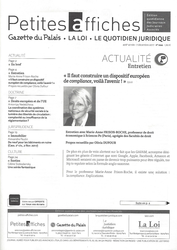
Référence complète : FRISON-ROCHE, M.-A., Il faut construire un dispositif européen de compliance, voilà l'avenir !, in Actualité/Entretien, Petites Affiches, propos recueillis par Olivia DUFOUR, n° 244, 7 déc. 2017, pp. 4-6.
Entretien donné à propos de la sortie de l'ouvrage Régulation, Supervision, Compliance.
Réponse aux questions suivantes :
- Quels sont les buts que vous assignez à la Compliance ?
- Que signifient ces deux concepts que vous introduisez : service public mondial et buts monumentaux ?
- Que devient l’État face à une entreprise globale ?
- Que pensez-vous du lanceur d'alerte ?
- Comment est affectée la relation entre l'Europe et les États-Unis ?
- Par la Compliance, les entreprises ne vont-elles pas gouverner le monde ?
______
Nov. 15, 2017
Thesaurus : Doctrine
► Référence complète : E. Daoud & G. Péronne, "Loi Sapin II, loi vigilance et RGPD. Pour une approche décloisonnée de la compliance", Dalloz IP/IT, nov. 2017
____
🦉Cet article est accessible en texte intégral pour les personnes inscrites aux enseignements de la Professeure Marie-Anne Frison-Roche
________
Nov. 21, 2016
Thesaurus : Doctrine
